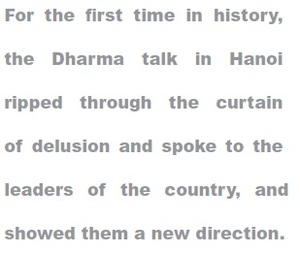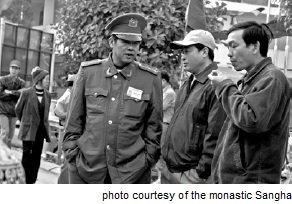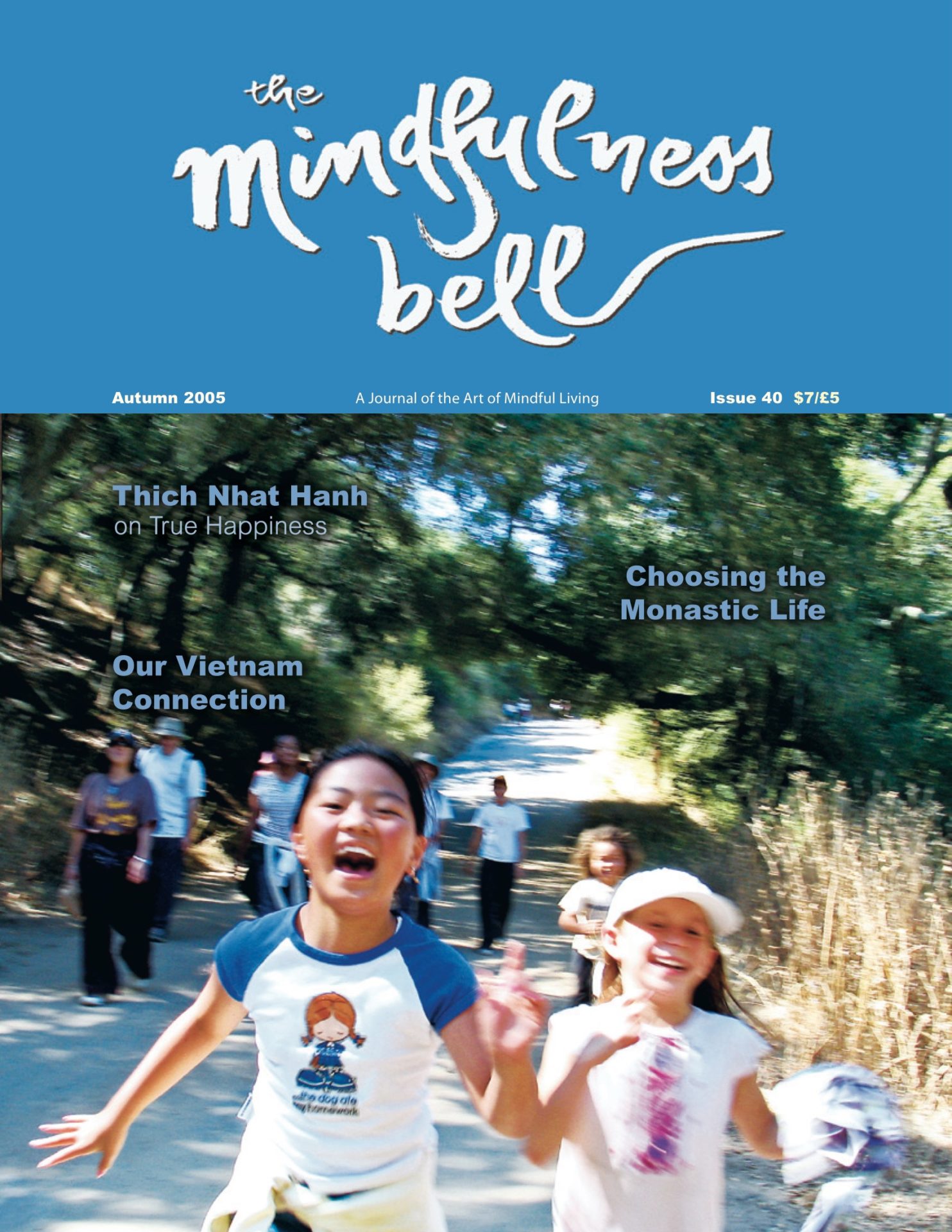Though many of us accompanied Thay and the monastic Sangha to Vietnam, it was not possible to understand all that was happening, right before our eyes. In this section, we get to hear Thay’s own words, fresh from returning, on what were the most notable events during the trip, and the possible future impact on the Vietnamese government as well as the monastics and lay practitioners there. In Thay’s articulate and practical style,
Though many of us accompanied Thay and the monastic Sangha to Vietnam, it was not possible to understand all that was happening, right before our eyes. In this section, we get to hear Thay’s own words, fresh from returning, on what were the most notable events during the trip, and the possible future impact on the Vietnamese government as well as the monastics and lay practitioners there. In Thay’s articulate and practical style, Thay offers the government a six-point plan to begin to transform their limited way of perceiving Buddhist practice, and to use the strengths of the past to solve current problems.
We also witness more threads continuing to be woven between our spiritual home and our Western roots. Poems, stories, and reports of humanitarian projects all bring us closer to claiming our heritage, not as an Asian or as a Westerner, but as a Buddha-to-be.
Shortly before returning to France from Vietnam, Brother Phap Huu said, “I’m ready to return” [to Plum Village]. I have thought about the words “to be ready.” Am I truly ready? If I am truly ready then I should feel at ease to either stay in Vietnam or return home. If I do not feel at ease, then I am not ready. The three months in Vietnam were very long and very deep. We need a long time to digest what we experienced, so it can nourish our bones and muscles and become part of us. We need at least six months to digest the experiences of this trip.
Before going, I felt I was ready to return to Vietnam. I knew there would be a lot of unexpected situations and difficulties, but I was ready to face them. I had already prepared the fifth mantra. An American lay practitioner devised a fifth mantra, for times when his wife has an idea and if he doesn’t agree with her, there will be discord in the family. So he created this fifth mantra: “Yes Madam. Yes Ma’am.”
We thought we would encounter a lot of obstacles in Vietnam because there are many people in power who are in conflict with each other. Going to Vietnam was like rowing a boat on the ocean, trying to steer skillfully to avoid the waves and sea monsters. We didn’t want to be upset or angry because of the obstacles, so we had to learn how to accept what occurred. When you encounter something that is difficult to accept you say, “Yes Ma’am,” and it becomes easier.
I also had faith that the ancestors, the spiritual patriarchs, had arranged everything, and they would show me the way. I went with a pure heart, a heart that has no plans, no intentions, no desire for gain or authority. If your heart is pure the patriarchs will guide you to do the things that need to be done, and to not do the things that don’t need to be done. I hope you will also have this faith because it helps you when you encounter difficulties. No matter how big the difficulty, you just entrust your whole being to the patriarchs. When you have a pure, clear heart without hidden motivations or a secret agenda, then everything will happen beautifully. This is what happened on the trip.
Accepting the Unexpected
Sometimes we think it best if everything goes according to our plan. But in truth, it is not so. For example, when we were in Hanoi, we asked the government’s permission to use large venues that hold up to six thousand people. We thought that speaking to as many people as possible would be the most effective way to share the practice. But the government would not allow this. At first, they only wanted us to speak within temple grounds. But because of protests, petitions, and requests, they allowed us to speak in a venue that held from three to five hundred people: a tiny amount. However, this turned out to be crucial, because the people who attended the talk were influential in the society: scientists, scholars, and people from important sectors of the government. Having three hundred people of this status and influence was more effective than having a crowd of thirty thousand. If we had tried, we could not have arranged to have such an audience.
For many, it was their first time receiving such helpful and wholesome teachings. After one talk, a popular Vietnamese scholar said that he thought Buddhism was a type of asceticism, that the practice was to just suffer, suppressing your body and mind. But his mind was changed when Thay talked about ways to bring happiness into your life.
What we taught responded directly to the deepest needs of the people. Their eyes and hearts opened. For the first time in history, the Dharma talk in Hanoi ripped through the curtain of delusion and spoke to the leaders of the country, and showed them a new direction. The talk changed their lives and the direction of their future. Perhaps if we had spoken to thirty thousand people, the benefit would not be as great.
During the trip, there were a lot of seeds sown into fertile earth for the first time. Once the seed is sown, it will grow into a beautiful, healthy tree. The Buddhists who listened to the talks were very happy because they need a Buddhism that will help them resolve their daily difficulties. In China and Vietnam now, the practice of Buddhism is mostly prayer and offering incense, the devotional aspect. Only a few people know of the most important aspect of Buddhism, the tradition of wisdom and insight. Venerable monks and nuns who had been practicing for sixty and seventy years, touched the joy and happiness of the Dharma for the first time and experienced real insight. We should praise them for their efforts to try to keep Buddhism alive for the next generations, but they were drying up. Also, the teachings to the young people have not been satisfying; but hearing our new teaching, they became joyful and enthusiastic.
Difficulties Created by the Government
There is a faction of people in the government that is oppressive, scared, and discriminatory, and they can create a lot of anger and division. They didn’t want Thay to return home; they accepted it only through pressure to improve their human rights record. They were determined to restrict Thay to only speaking to the old people. Many police belonged to this group.
For example, when Thay spoke at Thien Mu temple,1 one of the most beautiful temples in Vietnam, nine thousand people attended, sitting in the rain. But the police and government officials had told schoolteachers they must take their students camping that day, as a ploy to keep the students away from the event. This type of manipulation occurred from south to north, arranged by the opposing group within the government. If there was a greater attendance than expected at an event, they tried to curtail the event. In the past, the government oppressed the monastics and lay practitioners, not allowing them to have meetings. A government task force on “religious security” created a lot of wounds and division within the Buddhist community.

But there were also people who wanted Thay to return, who saw that his presence would be beneficial for the country. They hoped those opposing would see that Thay was not a threat but a help to Vietnam, that our presence would reduce their fear and discrimination. I knew that if I came home with a pure and virtuous heart, we could touch the people directly and give them faith. But I knew it would be difficult. There were also people in the government who supported Thay very much, but they could not speak out without risk to their careers.

The same happened in Hue, in Binh Dinh, and in Saigon. All together, there were eight talks for government workers and politicians, people we had never been allowed to be in touch with. Their openness was so beautiful. At the end I met President Tran Duc Luong and I suggested six points for the Communist regime to study and practice. I suggested that a Vietnamese Communist is someone firmly rooted in Vietnamese culture, and Buddhism plays an important role in the culture. It has shaped the people and played a decisive role in the governments of the former dynasties when Vietnam was becoming a united people. Buddhism has been in Vietnam for 2,000 years; it is not only a religion, it is an essence that has gone into the blood of the people. Vietnamese Catholics and Communists still have Buddhism within them.
Lighting incense on an ancestral altar in your home is part of Vietnamese culture, not superstition. It is a tradition of insight to acknowledge that you have roots in your ancestors. Buddhism is not something outside of you but inside, and everyone should have a spiritual dimension. Buddhism should not be put under surveillance; we have to let people have freedom.
Many spiritual cultures have entered Vietnam, including Confucianism, Taoism, and Buddhism. They have combined to become the ethnic and ethical heritage of Vietnam. The government officials who are Buddhist know they need to renew Buddhism and offer Buddhist insight to respond to the needs of the people. The leaders of the country need to step forward and respond to the immediate needs of the people without being dogmatic. If both sides are able to do that, then the Communists and Buddhists can hold hands and go forth in the same direction, working together so that Vietnam will have a future.
If you speak out opposing Communism, there will be no communication, only more struggle and war. We were able to discuss difficulties with the government because we didn’t condemn or judge them; instead, we opened a door to communication and development.
So the people in Vietnam also have a lot to digest and contemplate. It could take the lay practitioners and the monastics five years or more to understand and practice the new teachings. Consider how much longer it will take the government.
Walking in Freedom
After thirty-nine years of exile from my homeland, my only true desire was to walk with real steps of freedom. But if I were not ready, then my steps would not be free. Over the years, as I walked throughout the world, I trained myself to walk peacefully. Taking steps in Vietnam is the same as taking steps here in France; and here, I am still walking in Vietnam. It all depends on whether or not I am ready. A free step in Vietnam is a free step in Europe or America. So my homeland comes home with every step. There are no separate places; with one step you touch home in all places.
In Vietnam, people said, “Thay, you’ve just returned after forty years and you’ve been here for only three months. Why don’t you stay here with us?” They still discriminate. If I had not been in Europe for forty years, then what value would the three months have? Through distance and time we could see more about the country and the people, so that when we returned, we were actually much closer than before.
(1) Thien Mu Pagoda is also known for having staged pro-democracy demonstrations in the recent past. Their abbot has been in jail, though is now released. And the site holds the car-relic of Thich Quang Duc, the monk who drove the car to Saigon and immolated himself in protest during the war years under the Diem regime.

